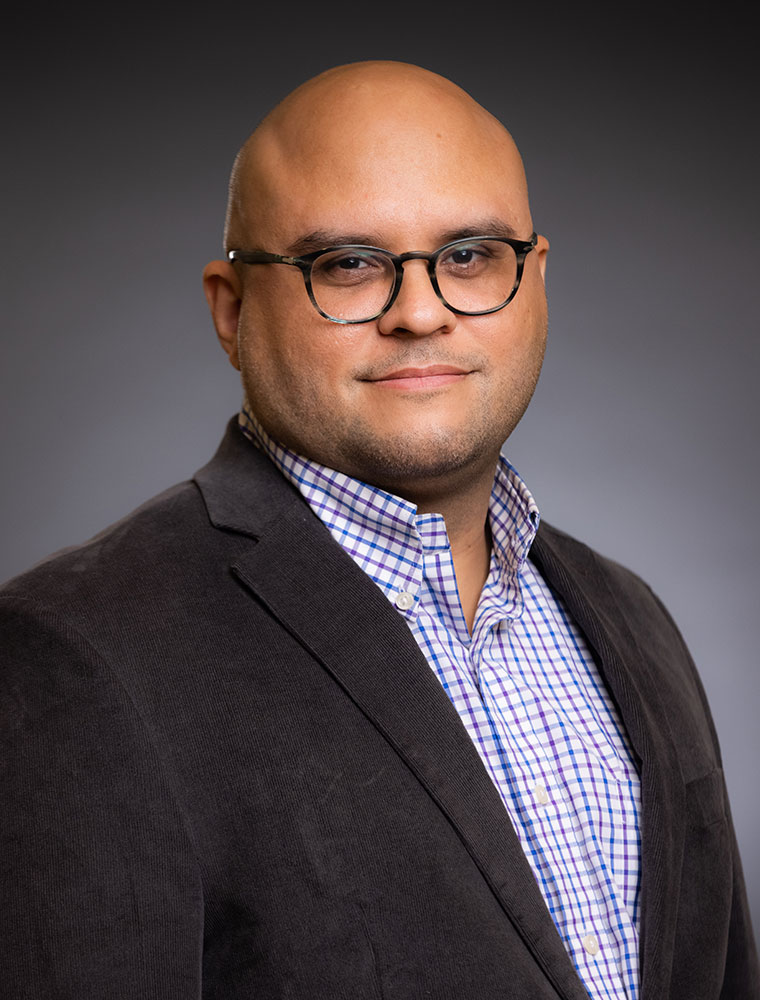BS, University of Puerto Rico-Mayagüez. PhD, Stony Brook University. Previously taught physics at Westchester Community College (Valhalla) and the College of Mount Saint Vincent (The Bronx). SLC, 2021–
Undergraduate Courses 2025-2026
Mathematics
Calculus II: Further Study of Motion and Change
Open, Seminar—Fall and Spring
MATH 3010
Calculus is the mathematical gift that keeps on giving—thank you, Newton and company! In this course, students will expand their knowledge of limits, derivatives, and integrals with concepts and techniques that will enable them to solve many important problems in mathematics and the sciences. By the end of the course, students will be able to judge whether answers provided by engine services such as WolframAlpha or ChatGPT are correct. Topics will include differentiation review, integration review, integration with non-polynomial functions, applications of integration (finding area, volume, length, center of mass, moment of inertia, probability), advanced techniques for integration (substitution, integration-by-parts, partial fractions), infinite sequences, infinite series, convergent and divergent sums, power series, differential equations and modeling dynamical systems, and, time permitting, parametric equations of a curve and polar coordinates. Students will work on a conference project related to the mathematical topics covered in class and are free to choose technical, historical, crafty, computational, or creative projects.
Faculty
Previous Courses
Physics
Classical and Quantum Waves
Intermediate, Seminar—Fall
This course, which will provide an introduction to both classical and quantum waves, is a required prerequisite course for those interested in pursuing the Columbia Combined Plan program in applied mathematics, applied physics, biomedical engineering, electrical engineering, and materials science and engineering. Topics will include: classical waves and the wave equation, oscillations and normal modes, Fourier series and Fourier transforms; quantum waves and the Schrödinger equation; topics from quantum physics, including quantization of energy levels and reflection and transmission off barriers; and various applications of waves corresponding to student interests.
Faculty
Introduction to Electromagnetism, Light, and Modern Physics (General Physics Without Calculus)
Intermediate, Seminar—Spring
This course covers electromagnetism and optics. Emphasis will be placed on scientific skills, including problem-solving, development of physical intuition, scientific communication, use of technology, and development and execution of experiments. Seminars will incorporate discussion, exploratory, and problem-solving activities. In addition, the class will meet weekly to conduct laboratory work.
Faculty
Introduction to Mechanics (General Physics Without Calculus)
Open, Seminar—Fall
This course covers introductory classical mechanics, including dynamics, kinematics, momentum, energy, and gravity. Students considering careers in architecture or the health sciences, as well as those interested in physics for physics’ sake, should take either this course or Classical Mechanics. Emphasis will be placed on scientific skills, including problem-solving, development of physical intuition, scientific communication, use of technology, and development and execution of experiments. Seminars will incorporate discussion, exploratory activities, and problem-solving activities. In addition, the class will meet weekly to conduct laboratory work. A background in calculus is not required.
Faculty
Quantum Mechanics
Intermediate/Advanced, Seminar—Spring
Prerequisite: at least two semesters of calculus; completion or plans to enroll in Multivariable Mathematics
There are three kinds of people: those who understand quantum mechanics; those who do not understand quantum mechanics; and those who both simultaneously understand and do not understand quantum mechanics. This course will provide an introduction to the theoretical foundations of quantum mechanics. Topics will include: the classical physics paradigm, quantum state vectors, quantum operators and observables, commutator relations, the Schrödinger equation and time-evolution, the quantum harmonic potential, the quantum Coulomb potential and the hydrogen atom, angular momentum and spin, and the Feynman path integral formalism. No cats will be harmed. Familiarity with introductory physics, complex numbers, vectors, dot and cross products, and matrices is useful but not required.
Faculty
Thermal Physics
Intermediate, Seminar—Fall
Prerequisite: at least two semesters of calculus and either completion or plans to enroll in Multivariable Mathematics
Some bears like their porridge very hot. Others like their porridge very cold. And then there are certain bears that like their porridge to have a temperature that is just right. What is temperature, anyway? In this course, we will not be cooking any porridge but will provide an introduction to thermal physics. Topics will include: thermodynamics (energy, temperature, work, heat, ideal gases); statistical mechanics (entropy, partition functions, distributions, chemical potential, non-ideal gases, bosonic gas, fermionic gas); and applications from physics, chemistry, and engineering (engines, refrigerators, Bose-Einstein condensates, maybe black holes). Previous experience with introductory physics (velocity, forces, energy) and chemistry is helpful but not required.
Faculty
Mathematics
Calculus II: Further Study of Motion and Change
Open, Seminar—Fall
MATH 3010
Calculus is the mathematical gift that keeps giving. (Thanks Newton and company!) In this class, you will expand your knowledge of limits, derivatives, and integrals with concepts and techniques that will enable you to solve many important problems in mathematics and the sciences. You will be able to judge whether answers provided by WolframAlpha or ChatGPT are correct. Topics will include: differentiation review, integration review, integration with nonpolynomial functions, applications of integration (finding area, volume, length, center of mass, moment of inertia, probability), advanced techniques for integration (substitution, integration-by-parts, partial fractions), infinite sequences, infinite series, convergent and divergent sums, power series, and, time permitting, parametric equations of a curve and polar coordinates. Students will work on a conference project related to the mathematical topics covered in class and are free to choose technical, historical, crafty, computational, or creative projects. It is recommended that students have at least one semester of calculus at either college or high-school level or be very comfortable with quickly learning any missing material.
